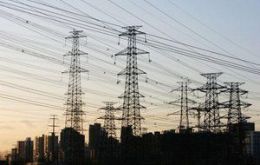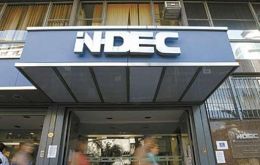MercoPress. South Atlantic News Agency
Tag: Indec
-
Thursday, October 13th 2011 - 23:23 UTC
Argentine ‘Congress inflation’ in August reached 1.89%, double the official index

Argentine opposition members of the Lower House released on Thursday the dissident inflation rate (‘Congress index’) for October. The index, which was set at 1.89%, is based on reports delivered by some private consultants, which differ substantially from that release by the INDEC Statistics Bureau Agency.
-
Monday, September 26th 2011 - 06:34 UTC
IMF insists Argentina must improve measuring inflation method

Nicolas Eyzaguirre, the IMF director for Latin America, stated that Argentina must apply “major measures” to improve its method of measuring the inflation.
-
Friday, September 23rd 2011 - 23:40 UTC
Argentina’ industrial output growth slowed down in August, says Indec

Argentina's industrial output growth slowed in August to 5.2% year-on-year, while month-on-month economic activity contracted in July for the first time in 13 months, the government said on Friday.
-
Friday, September 23rd 2011 - 01:41 UTC
IMF chief wants “constructive dialogue” with Argentina but warns about stats

The head of the International Monetary Fund, Christine Lagarde, said on Thursday that she wants a “constructive dialogue” with Argentina, while at the same time warned that she is not willing to make any “concessions” in terms of the quality of official data the IMF receives from member countries.
-
Thursday, September 22nd 2011 - 08:36 UTC
IMF will use private and provincial data to gauge Argentine economy

The International Monetary Fund will use estimates from the private sector and provincial governments to measure economic growth and inflation in Argentina, underscoring the IMF distrust of official data.
-
Saturday, September 17th 2011 - 05:03 UTC
Argentina’s economy expanded 9.1% in the second quarter, according to Indec

Argentina's economy grew 9.1% in the second quarter from a year earlier, the national statistics agency, Indec, reported Friday.
-
Thursday, September 15th 2011 - 07:02 UTC
August “official” inflation in Argentina, 0.8%, less than half the Congress index

‘Official’ inflation in Argentina hit 0.8% in August and accumulated 6.4% in the first eight months of the year and 9.8% in the last twelve months, according to the Indec statistics and census bureau.
-
Saturday, September 3rd 2011 - 07:40 UTC
Argentine August inflation at 2% pushed by food prices, say private estimates

A surge in fresh food prices has pushed Argentina’s August consumer inflation to one of the highest of the year, 2% over the previous month, according to private consultant estimates and published in the Buenos Aires press.
-
Friday, September 2nd 2011 - 08:45 UTC
Argentina’s population stands at 40.117.096, up 10.7% from the 2001 census

Argentina has a population of 40.117.096, according to the definitive facts of the 2010 National Population and Home census released by the country’s national statistics and census bureau, Indec.
-
Saturday, August 20th 2011 - 06:30 UTC
Consumers’ inflation expectation in Argentina remains steady at 25%, says UTDT

Argentina's 12-month inflation expectations were unchanged for a sixth straight month in August, according to a closely watched survey published by the Torcuato Di Tella University.
